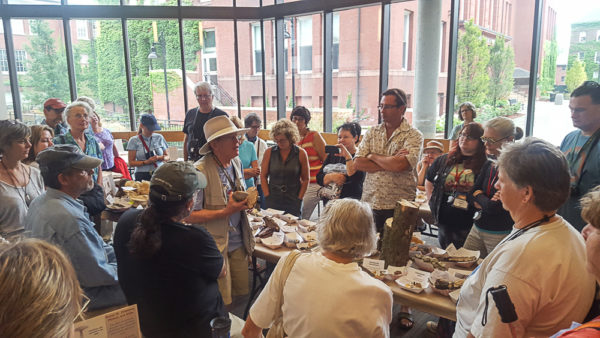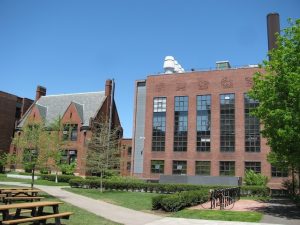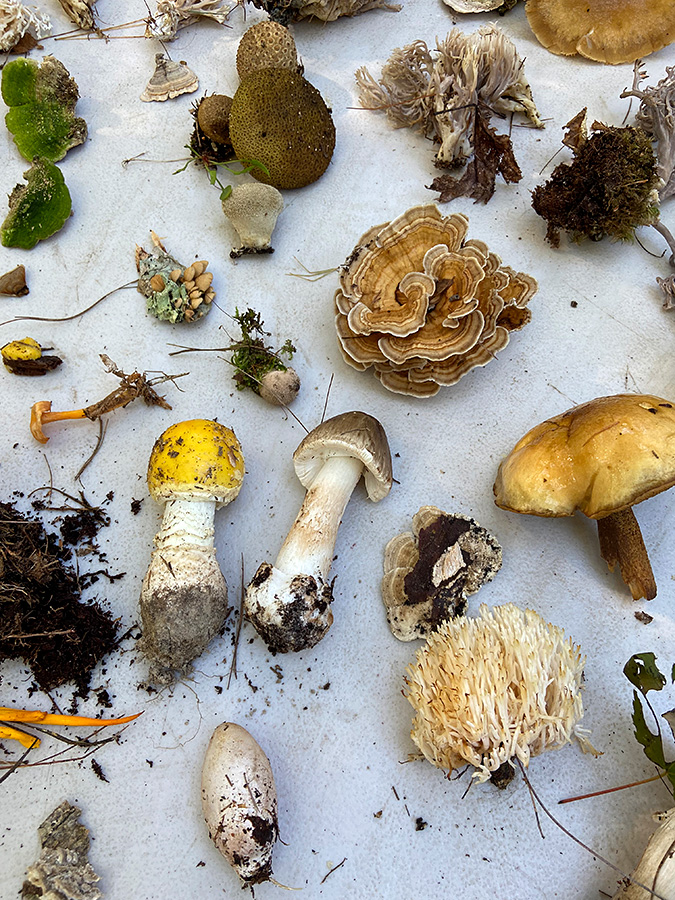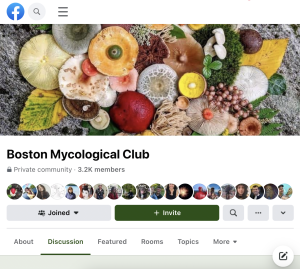About the BMC
History, Mission & Values
The BMC is a 501(c) 3 tax exempt, not for profit corporation. Its goal is to increase knowledge and appreciation of fungi.
Although fungi were originally believed to be plants, we now know that they are more closely related to animals, and are very different from either, having diverged about a billion years ago. However, they were not given their own kingdom until 1969. The world that we know could not exist without fungi, and we offer our members lectures, walks and resources aimed at exploring the amazing, beautiful and varied range and roles of the fungal kingdom.
The BMC was founded in 1895 and we believe that our club is the oldest continuously existing amateur mycological club in the world. The Washington, DC club was formed earlier but lost its title when it disbanded for a while; The Societé Mycologique de France was founded earlier but has turned itself into a professional society.
The club originally met in Boston’s elegant Horticultural Hall. We now meet in the Harvard Herbaria, located at 21 Divinity Avenue in Cambridge, continuing our preference for architectural distinction and historic relevance. Or at least we used to meet there before Covid closed Harvard to visitors, and we look forward to meeting there again. Our sponsor at Harvard, Professor Donald Pfister, has done a brilliant job of introducing us not only to fungi, but also to some of Harvard’s less public places, including the elegant historic Farlow Library and (on a secret night-time trip through dark corridors) the Museum of Natural History after hours, to enjoy the fungal component of Harvard’s famous glass flowers.
When the Club was founded, you could join only if two existing members nominated you. This is probably the only portion of the original By-Laws which has been renounced; today’s BMC welcomes all who wish to join.
Our mission hasn’t changed: we try to create a community that shares a belief in science; an interest in learning about all aspects of mycology, and the joy of socializing with a diverse group of fellow mycophiles. It’s unfortunate that most of our social activities have been stopped by Covid; we look forward to being able to restart our banquet, our potluck, our wine and cheese-fueled movie night, our in-person lectures and more. But we continue to work to educate our members via zoomed talks and outdoor walks, and to remember that the “M” in BMC stands for mycology – not just for mushrooms, charismatic as they may be.
If we had only one rule, it would be respect. Respect for each other; respect for the parks and preserves that allow us to visit and collect specimens, and respect for the planet’s ecosystems and those key players: the fungi.
But the second rule would be to have fun (and no tacky puns here about fungi), and to enjoy the variety of interests that our members have: walking in the woods, photographing and collecting mushrooms, cooking and eating mushrooms, identifying fungi, fungal ecology, microscopy, chemistry, DNA analysis and more. Wherever your particular interest lies in the vast Kingdom of Fungi, we’re happy to welcome you! The BMC is a big tent club.

Volunteering at the BMC
The BMC runs because its members volunteer. Every officer and person listed below is a volunteer. Stay tuned for opportunities to move deeper into the Club by working for it. You can volunteer for a one time task or an ongoing position. We guarantee that the more you give, the more benefits you’ll receive.
Contact the president David today if you’d like to volunteer.

Social Media
The BMC has both a public and a private FaceBook page, administered by Jana Harris. Your welcome letter contains the password for the private page.
Your welcome letter also tells you how to join the Club’s Google Group. We suggest that you do that right away; this group is the best way to ask for help identifying a specimen, and to find a ride to Club activities. Please sign up if you can offer a ride, as well as if you need one.
F.A.Q.
Why is the building called the Herbaria. Shouldn’t it be the singular Herbarium?
It’s named Herbaria because it contains six separate herbaria (collections of botanical specimens). One of the six, the Farlow Herbarium, contains Harvard’s fungal specimens.


